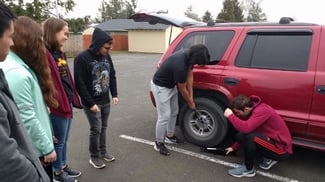Over the past two years, I have had the privilege of teaching a freshman experience course at our local university. In the first few weeks of the semester, I love to start class by asking students to share a good, bad, or confusing thing that they have encountered over the past few days.  Without fail I will hear things like, “My roommate showed me how to do my laundry, but now all of my whites are pink...” “I bought my own toothpaste for the first time!” “I almost burned down the dorm trying to make Top Ramen.” The theme continues throughout the room. Adulting is hard.
Without fail I will hear things like, “My roommate showed me how to do my laundry, but now all of my whites are pink...” “I bought my own toothpaste for the first time!” “I almost burned down the dorm trying to make Top Ramen.” The theme continues throughout the room. Adulting is hard.
As students progress through their college career they often swing by my office. “You’re a real adult, can you help me?” They have questions about scheduling medical appointments, how to read the benefits package offered by a potential employer, how to prepare for interviews, where to buy good quality shoes, how to meal plan.
They are struggling, but you can help!
Investing the time to teach your high school students these skills will give them a leg up as they leave the nest. They do not need to be an expert chef, with a fully balanced budget, and the first aid knowledge of an EMT, but they do need to know the basics. Having your student work alongside you is a great way to impart many of these skills. Bring them into the kitchen, out to the garage, and into the community with you. Ask them to assume responsibility for their own care while they are still under your roof. Have them schedule appointments, grocery shop, prepare meals, wash their own laundry. Keep in mind that many of these skills can be taught well before the teen years!
Nine areas you should work on with your student before they launch into college
I. Automotive
- Change a flat tire
- Install chains
- Check fluids
- Pump their own gas
- Oil changes
- Handle an accident
II. Medical
- Scheduling appointments
- Insurance basics
- Simple first aid
- Medications
- Personal medical
- Medical history
III. Employment
- Resume
- Interviewing basics
- Cover letter
- Professional email
- Forms of Identification
- Understanding an offer
IV. Food
- Balanced nutrition
- Follow a recipe
- Basic cooking skills
- Kitchen and food safety
- Clean up
V. Cleaning
- Laundry
- Cleaning a bathroom
- Cleaning a kitchen
- Organization
- Decluttering
VI. Money
- Online banking
- Keeping records
- Budgeting
- Credit cards
- Taxes and tax forms
VII. Social Skills
- Friendship
- Setting boundaries
- Self respect
- Manners
- Social etiquette
- Dating
VIII. Self Care
- Buying hygiene products
- Showering
- Personal grooming
- Appropriate attire
- Sleep
- Exercise
- Risk behaviors
-
Stress management
IX. Self Management
- Setting a schedule
- Goal setting
- Tracking appointments
- Digital wellbeing
- Taking breaks
.png?width=209&name=CSLA%20Logo%20Alt%20(1).png)
